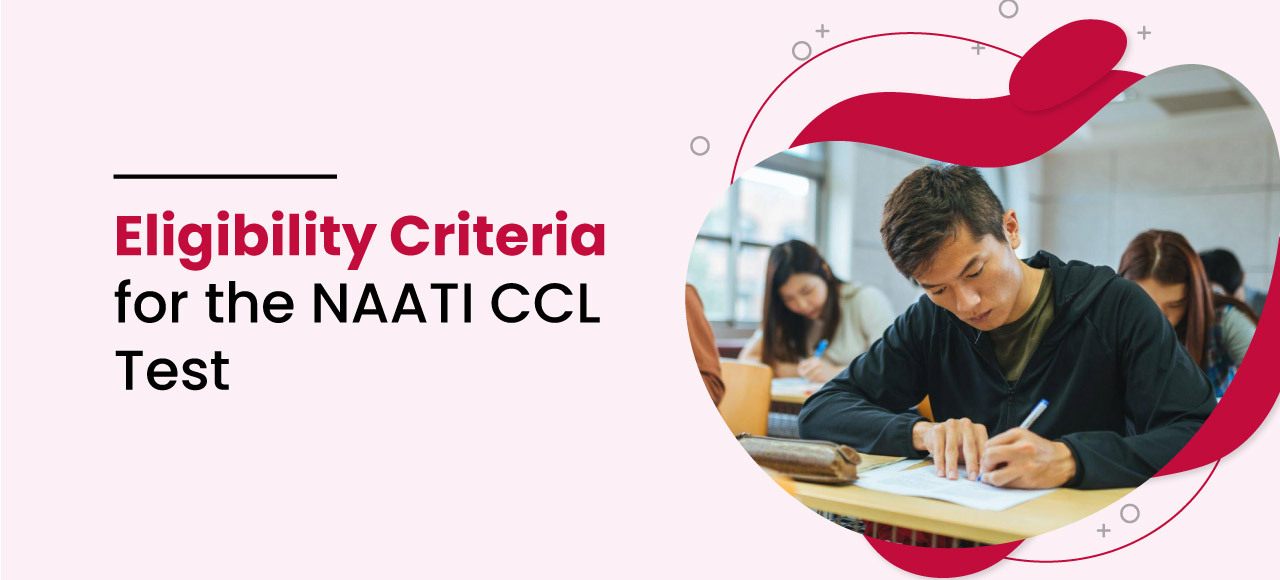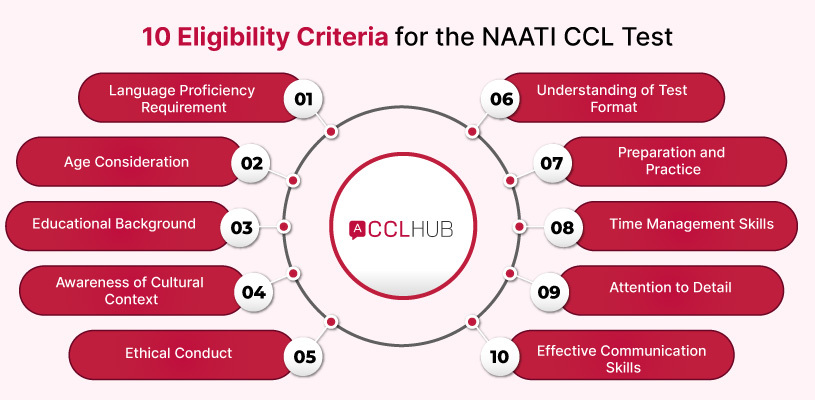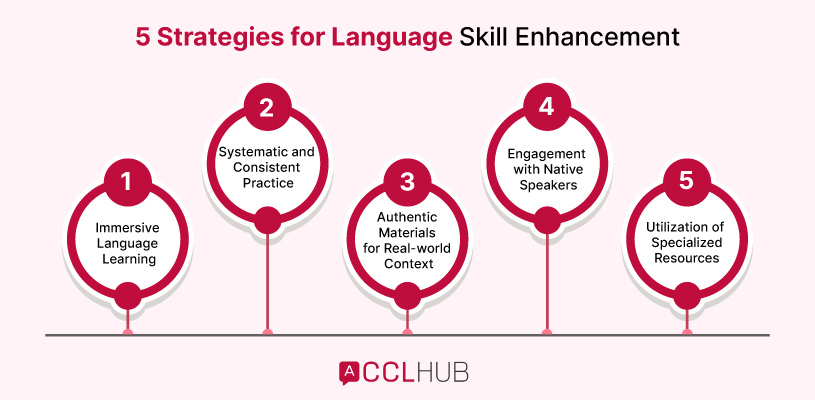
Eligibility Criteria for the NAATI CCL Test
The NAATI CCL (Credentialed Community Language) exam is an essential getaway for individuals wishing to immigrate to Australia or to pursue a translation or interpretation-related career. Further into the blog, we will cover topics around this test and the eligibility criteria for the NAATI CCL test.
In an increasingly interconnected world, where communication bridges gaps and facilitates understanding, the NAATI CCL test plays a role of significant importance. This examination evaluates an individual’s ability to effectively convey information between two languages.
Moreover, the NAATI CCL exam is a vital assessment for those who aspire to contribute meaningfully to cross-cultural dialogue and understanding. Hence, aspiring individuals on this journey find themselves on a path that aligns with effective communication, cultural exchange, and professional advancement.
Let’s explore the topic of eligibility criteria for the NAATI CCL test in detail.
🔔 Don’t Miss: Assessment Criteria of the NAATI CCL Exam.
How Will the NAATI CCL Test be Conducted?
The administration of the NAATI CCL test is a carefully structured process that reflects on evaluating real-world language proficiency and communication skills. This examination goes beyond traditional language tests by involving day-to-day scenarios where linguistic abilities are tested.
Unlike conventional language examinations, this test mirrors real-life interactions, such as those encountered in healthcare, legal, or social contexts. It is carried out in the comfort of your home, ensuring a convenient experience for all candidates.
Meanwhile, the examination revolves around audio recordings, where you will listen to the dialogues in English and your target language. The audio and dialogues reflect scenarios one might encounter in daily life.
Likewise, as a test-taker, you must interpret and convey the conversation accurately and coherently in the opposite language. This demands a profound understanding of both languages, swift decision-making, and effective communication skills.
By replicating the dynamic nature of real dialogues, the test assesses how well candidates can adapt to the spontaneous flow of a conversation. Furthermore, to ensure a fair and standardized assessment of the eligibility criteria for the NAATI CCL Test, NAATI employs a rigorous evaluation process.
Certified examiners proficient in both languages carefully assess each candidate’s performance. After assessment, you will receive your NAATI CCL test results in 8 to 10 weeks.
By providing a platform that replicates real-life linguistic encounters, the NAATI CCL test prepares you for a thrilling journey in various professional domains and cultural horizons. Let’s explore more NAATI CCL test facts you need to know.
10 Eligibility Criteria for the NAATI CCL Test

The eligibility criteria for the NAATI CCL test are fundamental prerequisites that test candidates must meet to undertake this assessment. Moreover, these criteria make sure that the candidates possess the necessary skills to engage in tackling the examination confidently and help clear the NAATI CCL exam in under one week.
Let’s explore the ten eligibility criteria of the NAATI CCL exam in brief.
1. Language Proficiency Requirement
Demonstrating proficiency in both English and the target language is a core criterion for the NAATI CCL test. Candidates should possess a high level of competency in their chosen language pair, allowing them to interpret and convey dialogues accurately and coherently.
Also, seamlessly switching between languages while maintaining context and meaning is key to successful performance.
Additionally, candidates must choose one of the NAATI-listed languages they feel proficient in. This includes languages commonly spoken in diverse communities, reflecting the multicultural fabric of Australia.
Demonstrating proficiency in these languages is vital, allowing candidates to bridge language gaps and facilitate effective communication within multicultural contexts. The NAATI CCL test acknowledges the importance of linguistic diversity.
2. Age Consideration
While there is no specific age limit, candidates should know that the test requires a certain level of linguistic maturity and cultural awareness.
Moreover, younger candidates may find it beneficial to gain more experience before attempting the exam, as life experiences often contribute to the understanding of context and subtleties in language.
The lack of age considerations in the NAATI CCL test allows individuals from different stages of life to pursue and demonstrate their language proficiency. This inclusive stance encourages a broad spectrum of candidates to engage with the test, contributing to the overall diversity and richness of linguistic talent in the multicultural context of Australia.
Therefore, candidates can confidently focus on preparing for the test, knowing that their age is not a determining factor in their eligibility or success.
3. Educational Background
Although formal education is not required, a background in language studies or related fields can enhance a candidate’s understanding of linguistic nuances and communication.
Also, educational exposure can provide insights into language structure and effective methods of several cross-lingual expressions. By setting the bar at high school completion, the NAATI CCL test acknowledges that effective communication skills can be developed through diverse educational paths.
This inclusive approach allows individuals from different educational backgrounds to showcase their language abilities without requiring extensive formal education. Hence, this straightforward educational requirement makes the NAATI CCL test an attainable goal for a wide audience, emphasizing practical language skills over formal academic credentials.
However, dedicate enough time to learning about the eligibility criteria and review your notes consistently.
4. Awareness of Cultural Context
An essential aspect of the NAATI CCL test is the ability to grasp and convey cultural subtleties within conversations. For this, candidates should be sensitive to accurate language interpretation.
Not to mention, understanding cultural references and contextual implications is vital to maintaining the authenticity of the dialogue.
In practical terms, candidates must be mindful of cultural differences and similarities between the source and target languages. This includes aspects such as customs, traditions, and social norms.
Having this awareness enhances your ability to convey messages culturally appropriately, ensuring that the intended meaning is accurately transmitted.
Furthermore, the NAATI CCL test’s focus on cultural context aligns with the real-world scenarios where interpreters often operate. This awareness contributes to successful communication in diverse settings.
5. Ethical Conduct
Candidates are expected to adhere to ethical standards during the examination. Plagiarism, cheating, or dishonesty is strictly prohibited and can result in disqualification.
Similarly, upholding ethical conduct not only preserves the integrity of the test but also reflects qualities crucial for professional interactions in multicultural environments.
Ethical conduct also means respecting the confidentiality of the test. You shouldn’t talk about the specific questions or content with others.
So, if you value honesty and fairness, you’re on the right track. Beyond the test, ethical conduct extends to how you generally handle language practice. It’s about honesty, transparency, and fairness in all language-related dealings.
This commitment to doing things ethically adds credibility to language proficiency assessments and shows that you take your language work seriously and helps you understand the eligibility criteria for the NAATI CCL Test.
6. Understanding of Test Format
If you plan to take the NAATI CCL test, you must familiarize yourself with the c, which involves interpreting dialogues between two speakers in English and the target language.
Understanding the test format is also crucial for effective preparation. Likewise, being well-versed in the test format helps you allocate time wisely and strategize your approach.
Being familiar with this format is crucial. It allows you to focus on the main points, understand the context, and convey the messages clearly in both languages. Knowing what to expect reduces stress and helps you confidently approach the test.
Moreover, preparation materials and mock tests provided by NAATI are valuable resources to grasp the test format. These materials often mirror the test conditions, giving you a feel for the pace and requirements.
So, take the time to get to know the format, practice regularly, and you’ll be well-prepared for the NAATI CCL exam.
7. Preparation and Practice
Adequate preparation is vital. Engaging in practice sessions, mock tests, and reviews of relevant materials can significantly help you improve your performance and confidence.
Furthermore, regular practice refines interpretation skills, builds vocabulary, and hones the ability to manage stress during the live exam. Set aside time each day to work on your language skills.
Also, practice interpreting conversations, paying attention to accuracy and fluency. You can involve a language partner or use online resources to simulate real test conditions.
Likewise, review and learn from your mistakes. If you stumble on certain phrases or concepts, focus on improving those areas. The goal is steady progress over time.
So, practice until you can handle different accents, speeds, and topics effortlessly.
In a nutshell, preparation and practice are your allies for the NAATI CCL test. Consistent effort and targeted practice will boost your confidence and readiness for the big day.
8. Time Management Skills
The NAATI CCL test demands quick thinking and timely responses. Hence, effective time management during the exam ensures candidates can interpret and convey dialogues within the allocated time frame.
Also, practicing under timed conditions helps to create a sense of urgency and to prioritize key information during preparation and test day.
During practice sessions, use a timer to simulate test conditions. This helps you get accustomed to working within the time constraints and improves your pacing.
Prioritize the main points. While conveying the complete message is essential, focus on the key information to ensure you stay within the allotted time. This strategic approach prevents you from getting bogged down in details and helps you manage your time more efficiently.
9. Attention to Detail
The ability to catch linguistic nuances, idiomatic expressions, and cultural references is a crucial factor in clearing your NAATI CCL test. Likewise, you must pay close attention to detail to ensure accurate interpretation.
Being attentive to nuances is critical. Languages can be tricky, and small changes in words or expressions can alter the meaning. Your ability to pick up on these subtleties enhances the accuracy of your interpretations.
Moreover, practice with various topics and scenarios to sharpen your attention to detail. This helps you become more adaptable and ensures you can capture specific details regardless of the subject matter.
During the test, listen carefully to both speakers and mentally note essential details.
10. Effective Communication Skills
Beyond linguistic proficiency and all the points mentioned above, the most important skill you must have is strong communication skills. For this, you will need clarity, coherence, and the ability to express thoughts accurately, ultimately contributing to successful test performance.
Likewise, practice a lot so you can talk without stopping and sound natural. It’s like making sure the wheels turn smoothly when discussing different stuff. The test covers lots of topics, so being able to talk about anything is helpful.
Practice helps you get used to different things people might talk about.
Lastly, being good at talking in different situations is vital. The test looks at how well you can talk about different things. So, practice talking about lots of different stuff. It helps you improve at talking in a way that makes sense and fits the situation.
✅ Learn more: Christmas sale for NAATI CCL courses 2023. 🎄🎄
5 Strategies for Language Skill Enhancement

Enhancing language skills for the NAATI CCL test involves a structured approach that is beyond mere vocabulary memorization. To ace this assessment, candidates must adopt a wide number of strategies.
Also, these strategies not only build language proficiency but also help develop the ability to interpret and convey dialogues accurately in diverse contexts. Let’s explore five strategies for language skill enhancement to clear your exam on your first attempt.
1. Immersive Language Learning
Immersion means surrounding oneself with the target language through activities such as reading, listening to podcasts or news, and watching movies or TV shows.
Moreover, Immersive exposure helps develop familiarity with language use, idiomatic expressions, and cultural references, thereby enriching linguistic capabilities and contextual understanding.
Additionally, reading books, articles, or news in the language of focus offers a contextual understanding of word usage and expands your vocabulary. This method allows for a holistic approach to language learning, integrating reading, listening, and cultural exposure.
2. Systematic and Consistent Practice
Establishing a practice routine that covers various language aspects is essential.
Hence, I suggest you regularly engage in translation exercises, dialogic role-playing, and spontaneous speaking to develop fluency, accuracy, and quick thinking. These skills are very vital to clear the NAATI CCL test and acquire five Australian PR points.
To systematize your practice, divide your language learning into distinct components. Allocate time for listening exercises, speaking practice, reading materials, and interactive activities. This diversified approach ensures a well-rounded development of your language skills.
Utilize language learning apps or online resources that provide structured lessons and exercises aligning with your systematic practice plan.
3. Authentic Materials for Real-world Context
Use authentic materials like newspapers, interviews, and podcasts to simulate real-life language scenarios encountered in the test.
Analyzing and interpreting such materials trains candidates to navigate language and adapt to diverse conversational styles. Similarly, establish a balanced approach in your study routine to integrate authentic materials effectively.
Dedicate specific time slots for reading, listening, and interactive activities. This strategy not only enhances your language skills but also cultivates a familiarity with real-world language use, a valuable asset for success in the NAATI CCL test.
4. Engagement with Native Speakers
Interaction with native speakers exposes candidates to natural accents, intonations, and communication styles.
Similarly, conversations with natives provide opportunities to refine comprehension and communication skills, helping candidates feel more at ease during the NAATI CCL test. To maximize the benefits of this strategy, consider participating in language exchange programs or online platforms that facilitate conversations between language learners and native speakers.
Also, constructive input helps you identify areas for improvement, refine your pronunciation, and gain insights into cultural nuances. This feedback loop contributes to a continuous learning process, allowing you to fine-tune your language skills in preparation for the test.
5. Utilization of Specialized Resources
Leverage resources tailored explicitly for NAATI CCL test preparation. These can include NAATI CCL tutorials, official NAATI CCL practice materials, free NAATI CCL samples, and NATI CCL mock tests that mirror the examination format.
Meanwhile, such resources aid in helping candidates understand the test’s unique requirements. Always use resources from the official website or trusted sources like CCLHUB. Consider enrolling in specialized language courses or workshops focused on NAATI CCL test preparation.
Also, these programs are designed to address the test’s specific challenges, offering targeted instruction and practice scenarios. The guidance from experienced instructors and the structured curriculum contribute to a more systematic and practical preparation process.
✅ Check Out: How to Access Free NAATI CCL Test Samples?
What is the Validity of the NAATI CCL test?
The NAATI CCL test is an essential assessment for individuals to earn five important PR points and showcase their language proficiency in a formal setting. The validity of the NAATI CCL test holds significant importance as it opens doors for various career opportunities and immigration pathways, particularly in Australia.
Firstly, the NAATI CCL test’s validity is recognized by several reputable institutions, employers, and immigration authorities. This recognition translates into valuable opportunities for individuals who pass the test, including employability in linguistic fields and the ability to earn five points towards Australian Permanent Residency (PR) applications.
Furthermore, the validity of the NAATI CCL test is a practical approach that ensures successful test-takers possess the language skills required for effective communication in professional and community settings. In an increasingly interconnected world, communicating effectively with diverse communities is a valuable asset. The test reflects the need for individuals to engage with people from various linguistic and cultural backgrounds, making it relevant for career growth.
The NAATI CCL test is valid for five years. Within this period, you can reap several benefits for your career advancement and immigration.
Conclusion
In conclusion, the NAATI CCL test plays a significant role in unlocking opportunities both in the realm of language-based careers and the pursuit of Australian Permanent Residency. I hope you are clear about the eligibility criteria for the NAATI CCL test.
The NAATI CCL test’s strength lies in its practical evaluation of real-world communication abilities. Also, the NAATI CCL test’s relevance shines brightly.
As societies become increasingly interconnected, the demand for effective communication across languages and cultures remains constant. Hence, it is a vital tool to bridge gaps in communication.
Similarly, to help you with NAATI CCL success, CCLHUB stands as a guiding light. As an online portal catering to all things related to the NAATI CCL Online Test, CCLHUB offers a comprehensive solution.
CCLHUB is a platform that serves as a reliable source for information and guidance, providing NAATI CCL course materials that empower candidates with essential knowledge. Furthermore, it offers NAATI CCL mock tests, allowing aspirants to simulate the test environment and refine their skills.
Moreover, the availability of free NAATI CCL test samples helps NAATI CCL test candidates excel in their tests.
Happy Learning!!
🔔 Also, check out: Benefits of one-on-one online classes for NAATI CCL.
FAQ
Successfully passing the NAATI CCL test can open doors to various career opportunities in linguistic fields and provide five points towards Australian Permanent Residency applications, making migration more accessible.
The NAATI CCL test is open to individuals proficient in a language pair recognized by NAATI, typically involving a language in demand and English. This includes both residents and non-residents of Australia.
Yes, international students residing in Australia can take the NAATI CCL test to improve their language skills and improve their prospects for career and residency opportunities.
CCLHUB is an online platform designed to assist individuals preparing for the NAATI CCL test. It offers NAATI CCL course materials, mock tests, and free test samples to aid in comprehensive preparation.
Yes, the test involves a specific language pair, usually one in high demand in Australia, along with English. NAATI provides a list of eligible languages for the test.



